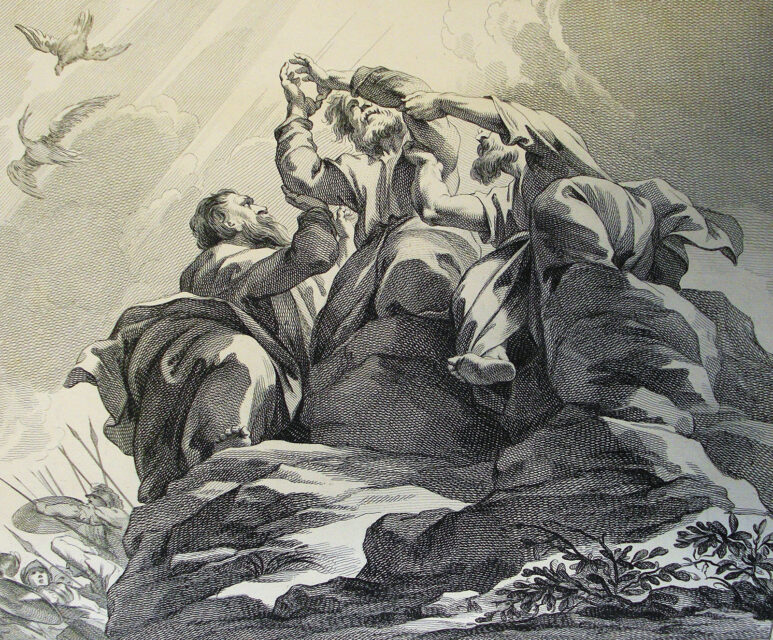(RNS) — I am talking to a very pro-Israel friend. This is what he says to me: “Hamas is Amalek! No, actually — the Palestinians themselves are Amalek.”
I sigh.
As I politely retreat from that conversation, I recall a woman who used to tell me about her terrible, toxic boss.
She would refer to him not by his name, but as Amalek.
Who — or what — is Amalek?
In Genesis 36, in a long list of “begats,” an entire chapter of the Torah lists the descendants of Esau, Jacob’s estranged brother, “who reigned in the land of Edom before any king reigned over the Israelites” (Genesis 36:31).
Just get your head around that. The Torah includes honored references to the descendants of the rejected brother of Jacob. Not only that; that chapter reminds us that the descendants of Esau had kings before Israel did.
This is a deliberate blow against Jewish ethnocentrism. “You think you’re such a wonderful nation because you have kings and sovereignty? Guess what? The Esau people — the descendants of the brother who is the refugee of the covenant — they had kings before you did.”
Amalek became a tribe of desert raiders that attacked the Israelites when they left Egypt.
Remember what Amalek did to you on your journey after you left Egypt — how, undeterred by fear of God, he surprised you on the march, when you were famished and weary, and cut down all the stragglers in your rear … You shall blot out the memory of Amalek from under heaven. Do not forget! (Deuteronomy 25:17-19)
Amalek is the archetypal murderous and mythic hater of the Jewish people — the ancestor of Haman, whose name must also be blotted out on the holiday of Purim.

The battle with Amalek.
(Credit: congers.org)
I recall a custom that I learned some years ago.
My thing is fountain pens. The “Jewish” way to test a pen is to write the word Amalek in Hebrew with it, and then immediately scribble it out.
If the pen doesn’t skip while doing this, then the pen is good.
Several years ago, I visited a pen boutique on Dizengoff Street in Tel Aviv. I was “auditioning” a fountain pen for purchase, and that is precisely what I did.
The elderly owner watched me, and tears formed in his eyes. His grandfather had been a scribe in Poland, and whenever the old man would commence the writing of a scroll, that is precisely what he would do. When he saw me do that, it evoked a sweet childhood memory.
Why do we blot out the name of Amalek?
Because Amalek evokes a world in which there is no yirat Elohim, no “awe of God.” This is a world in which there is no ethical core, because it lacks transcendence.
But why should we single out Amalek for unique and radical hatred? My ancestors did not lack for enemies. The Egyptians, Philistines, Edomites, Moabites, every surrounding nation and tribe: They all hated us and wanted to kill us.
And yet, we reserve this lasting, bone-deep enmity just for the Amalekites?
Here is why.
Amalek was different. Amalek came after us, treacherously, and made a point of killing the weakest among us.
Yes, just as Hamas did — by killing young people and old people and grandparents — and taking infants and the elderly as hostages, and refusing access to the Red Cross.
As Rabbi David Wolpe recently put it: “Hamas is Amalek-adjacent.”
I would agree. Hamas is the closest thing we have gotten to Amalek in 80 years.
Consider the phenomenon of people ripping down posters of hostage children, and the much more evil phenomenon of international NGOs minimizing or even denying Hamas’ heinous acts of sexual violence against Jewish women.
This is what I now believe. I believe those two acts — ripping down posters and denial of sexual violence — constitute the way people push back against the reality of radical evil.
We simply have no vocabulary for what we experienced.
That is why people resort to “Amalek”; the language is helpful. It serves as a historical marker. It locates our anger and our despair in a convenient place. We live through our myths and our archetypes.
And yet.
There is a danger in identifying your enemy as Amalek. It means that morally you are going to Def Con 3. Once you believe your enemy embodies cosmic evil, you have made your enemy into a symbol. You dehumanize that enemy.
And then, what happens? Once you dehumanize people, you can engage in violence against them. Don’t believe me? Why do you think the Nazis delighted in referring to the Jews as “vermin” who must be “exterminated”? It makes it so much easier to kill.
That is what many radical Jewish settlers on the West Bank have done. They have dehumanized innocent Palestinians and they have killed and otherwise harmed them. That is the danger of Amalek thinking.
But there is an opposite tendency as well, and that is to deny evil exists. This is the intellectual fad of seeing everything as relative, or culturally determined, or as we have seen recently, dependent on context.
The Protestant theologian Reinhold Niebuhr wrote that modern culture has been completely oblivious to the abiding mystery of evil in human life.
The Hebrew Bible soberly understands that mystery. Its view of human life is far from optimistic. It is in many cases profoundly pessimistic or, we might say, realistic. “The wickedness of man is great on the earth.” “Sin crouches at the door.” “Woe to those who call good evil and evil good.” These are the truths that the Torah teaches, that the prophets restate, that the psalmist echoes.
The ancient sages understood the inner architecture of the human being. Within us is the yetzer ha-ra and the yetzer ha-tov, the evil inclination and the good inclination, and those drives and inclinations struggle within us.
It is not only the inner architecture of the human being. It is the inner architecture of our civilization itself. Those two struggle for the soul of humanity.
Jew-hatred is the yetzer ha-ra, the evil inclination, of Western civilization.
Or, think about it in kabbalistic terms. It is the sitra achara, the demonic manifestation of reality — the “dark side of the Force,” if you will.
One last thing about Amalek.
Remember what Amalek did to you on your journey after you left Egypt — how, undeterred by fear of God, he surprised you on the march, when you were famished and weary, and cut down all the stragglers in your rear … You shall blot out the memory of Amalek from under heaven. Do not forget!
In Jewish mysticism, there is a system called gematria. It means you can take Hebrew letters and transform them into numbers, and when you find two words with the same numerical equivalent, that means they are connected.
The Hebrew for Amalek is numerically equivalent to the Hebrew word safek, which means doubt.
In this reading, it is no longer Amalek, the desert raider, that attacked us.
“Doubt” attacked us.
The battle we are now engaged in is far deeper than Israel vs. Hamas, or even Israel and the West vs. Iran, or even Samuel Huntington’s “clash of civilizations” between the West and its enemies.
We are engaged in a battle over the very meaning of civilization itself. It is a battle in which we must ask ourselves whether we will surrender to the forces of nihilism that are sweeping across many of our nation’s campuses — colleges and, yes, high schools, and soon, I fear, middle schools as well.
But, to quote Rabbi Wolpe, once again: The evil we are now encountering is, at the very least, Amalek-adjacent.
And yes, we must fight it, and we must blot it out.






